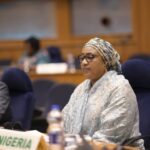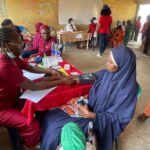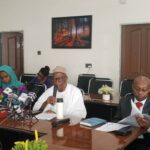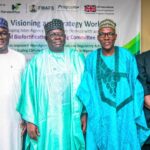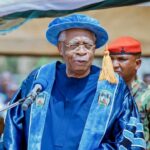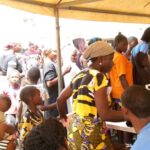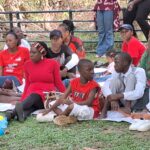By Magdalene Ukuedojor, News Agency of Nigeria (NAN)
At 18, every Nigerian who is registered with the Independent National Electoral Commission (INEC) and possesses a Permanent Voter Card (PVC) is eligible to vote during elections.
However, when you can barely see to sieve through the write ups and logos of the different political parties vying for attention, that right is taken from you.
For the blind, braille is preferable at voting polls while for those with albinism, a different set of help is needed – a magnifying glass which is an instrument that can block sun rays and magnify the words on the ballot papers.
UN Albinism Ambassador, Mr Jake Epelle, turned 18 in 1979. Eligible to vote, but had to wait 40 long years to exercise this right.
“I never voted in Nigeria until I was 58 and the reason is not farfetched, it’s because the process was not conducive.
There was no introduction of solution devices like magnifying glasses so it was practically impossible for me to vote because I couldn’t see plainly the tiny logos on the ballot papers,” Epelle said.
Epelle was born with albinism, a group of inherited disorders characterised by little or no melanin production.
Most people with albinism have pale skin, eye conditions and are sensitive to the sun.
It is estimated that over 2million people with albinism live in Nigeria. Many are faced with stigmatisation and discrimination.
In Africa, research has shown that the prevalence of albinism generally ranges from 1 person in 5,000 to as low as 1 person in 15,000.
It has been reported that some selected populations in Southern Africa have high prevalence rates.
Prevalence as high as 1 in 1,000 were reported for selected populations in Zimbabwe and other specific ethnic groups in Southern Africa.
Just like Epelle, a good number of persons with albinism in Nigeria were disenfranchised due to lack of modalities to aid a smooth electoral process.
Epelle was able to cast his first vote in the 2019 elections at 58, using a magnifying glass.
In the Electoral Act of 2010, it was enshrined in Section 56, subsection 1, that:
A voter who is blind or is otherwise unable to distinguish symbols or who suffers from any other physical disability may be accompanied into the polling unit by a person chosen by him.
“And that person shall, after informing the presiding officer of the disability, be permitted to accompany the voter into the voting compartment and assist the voter to make his mark in accordance with the procedure prescribed by the commission.”
Also, subsection 2 of the same Act on blind and incapacitated voters stated that:
“The commission may take reasonable steps to ensure that voters with disabilities are assisted at the polling place by the provision of suitable means of communication, such as braille, large embossed print or electronic devices or sign language interpretation, or off-site voting in appropriate cases.”
The ‘may’ clause used in subsection 2 of the Act did not give stringent powers for the inclusion and insistence of the use of tools to aid persons with disability during election.
The advocacy that made the change in the Electoral Act
The Albino Foundation, founded in 2006, collaborated with other stakeholders to initiate strategic advocacy to prioritise the needs of persons with disability (PWDs) which include those with albinism.
The foundation engaged government agencies, the electoral body- INEC, National Assembly and various other stakeholders in talks and meetings to understand the need for the inclusion of PWDs in the electoral process.
It granted interviews to the press, featured on talk shows, made presentations during National Assembly retreats, engaged in lobbying to underscore the need to amend certain areas in the Electoral Act to favour PWDs.
The advocacy yielded results in 2021, when some clauses proposed by the foundation was part of the amended electoral law.
On Feb. 25, President Muhammadu Buhari signed the 2022 Electoral Act Amendment Bill into law, the new Act ‘2022 Electoral Act’ repealed the Electoral Act 2010.
In the new Act, in Section 54, subsection 2, the word ‘may’ has been changed to ‘shall’ which is more solid and binding for the provision of aids.
It states: “The commission shall take reasonable steps to ensure that persons with disabilities, special needs and vulnerable persons are assisted at the polling place by the provision of suitable means of communication, such as braille, large embossed print, electronic devices, sign language interpretation, or offsite voting in appropriate cases.”
The 2022 Electoral Act also depicts gender and name sensitivity in including ‘her’ and ‘visually impaired’ where otherwise it stated only ‘him’ and ˜his’ and captured ‘blind’ in the Electoral Act 2010.
“A voter with visual impairment or other form of disability who is otherwise unable to distinguish symbol or who suffers from any other physical disability may be accompanied into the polling unit by a person chosen by him or her.
“And that person shall, after informing the presiding officer of the disability, be permitted to accompany the voter into the voting compartment and assist the voter to make his or her mark in accordance with the procedure prescribed by the commission.” -Section 54, subsection 1, 2022 Electoral Act.
“Of course, it’s not a matter of semantics or use of words,” Epelle says.
“The latter gives more legal impetus and mandate to INEC, it is now a must. In 2010 you couldn’t take INEC to court because they did not factor in the disability in the electoral process.
“Now in 2022, I can take INEC to court if they do not incorporate disability in the electoral process.
“If they don’t use magnifying glasses, I can go to court and it can actually nullify the election so now it’s a legal issue.
“It’s binding on them to ensure that they make this provision and ensure that it is part of their operations, it is operationalised and the people that will use it will indeed use it,” Epelle said.
He advised any organisation or group that wants to advocate for certain rights to engage a legal team and consult widely.
“We brought the community together and all agreed we were going to do this; we put together a legal team and the legal team drafted the clauses.
“It was more than two but we got only two into the Act; we made amendments where wrong terminologies were used and all that and then we went to the National Assembly.
How the Magnifying Glass was introduced
Armed with the Act to provide suitable means of communication, the foundation set out to propose to INEC the use of magnifying glasses for those with visual impairment and persons with albinism.
Different brands and types of the magnifying glasses have been tried remotely since the 2015 elections and have continued to evolve after use with input from the users.
In the Nov. 18 Anambra Elections of 2017, the Chairman of INEC, Prof. Mahmood Yakubu, told the EU Observer Mission to Nigeria led by Mr Santiago Ayxela, that the provision of the magnifying glasses was part of the commission’s efforts to ensure inclusiveness in the elections.
In 2019 general elections, the tool was also used by some persons with albinism and other visually impaired.
But with the victory of a more vibrant clause for PWDs in the 2022 Electoral Act, the foundation boldly engaged with INEC to procure a more user-friendly magnifying glass for its elections going forward.
This highly effective model was used during the Ekiti Governorship Election in June and Osun Governorship Election in July.
Its outstanding features are the high definition HD lenses, lighting effects with knobs to increase or decrease light shades to adjust to the user’s eyes and a smart handle with a solid grip.
The attendant result of this, has spurred more persons with albinism to confidently register for their PVC, knowing that they will, without stress, vote smoothly in the 2023 General Elections.
This is affirmed in the Joint National Association of Persons with Disabilities (JONAPWD)’s analysis and results, after the validation of eligible voters with disabilities for the 2023 General Elections.
“Total Number of Persons with Disabilities registered for 2023 Elections using the Automated Biometric Identification System (ABIS) are 84,072.
“Of this number, registered persons with albinism are 20,345, making 24 per cent of the registered voters, the analysis showed.
This user-friendly magnifying glass is also branded to avoid it getting into the open market. “Not for sale, property of INEC is inscribed on it.
Stakeholders have commended INEC for championing inclusion and improving on ways to ensure that PWDs participate maximally during elections.
INEC, on its part, has pledged to continue to promote the inclusivity of persons with disabilities in electoral processes by advancing their rights and participation.
“I must say from the outset that PWDs are citizens and have the right to participate in all areas of human activity without stigma or discrimination.
“Their systematic exclusion on account of disability has affected a significant part of the Nigerian population from effective participation in many areas of human endeavour, especially political and leadership roles at all levels. This is unacceptable.
“The National Population Commission estimates that at least 19 million Nigerians are living with disabilities.
“From our records, many of them are registered voters.
“We owe it a duty to our democratic and electoral processes, as well as national growth and development, to encourage their active participation as citizens with equal rights, INEC Chairman Yakubu said.
The Albino Foundation maintains that the magnifying glass used for the electoral process is not only for the use of people with albinism but for any visually impaired at polling units.
In spite of many successes, many limitations exist, the numbers of people with albinism and their clusters in local government areas and polling units across the country are still outstanding.
20,345 eligible voters, spread across the country, needing magnifying glasses may be a herculean task to achieve in the short space of time.
A fair knowledge of which locations and voting units is needed to measure the number of assistive devices like the magnifying glasses to be deployed by INEC for use in polling units.
Although the Albino Foundation is in the process of creating a database and app to assist INEC locate clusters that would need the magnifying glasses, Nigeria’s Presidential and National Assembly Elections billed for February 25, 2023, is in less than three months.
It is, however, hoped that the 2023 census which Nigeria has scheduled to undertake after the elections, will ensure an accurate database for all sectors.
It will put an end to conflicting figures and lack of accurate data for PWDs, including those with albinism.
That way, resources will be equitably distributed and accountability assured.
**If used please credit the writer and the News Agency of Nigeria (NAN)


